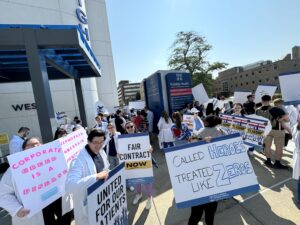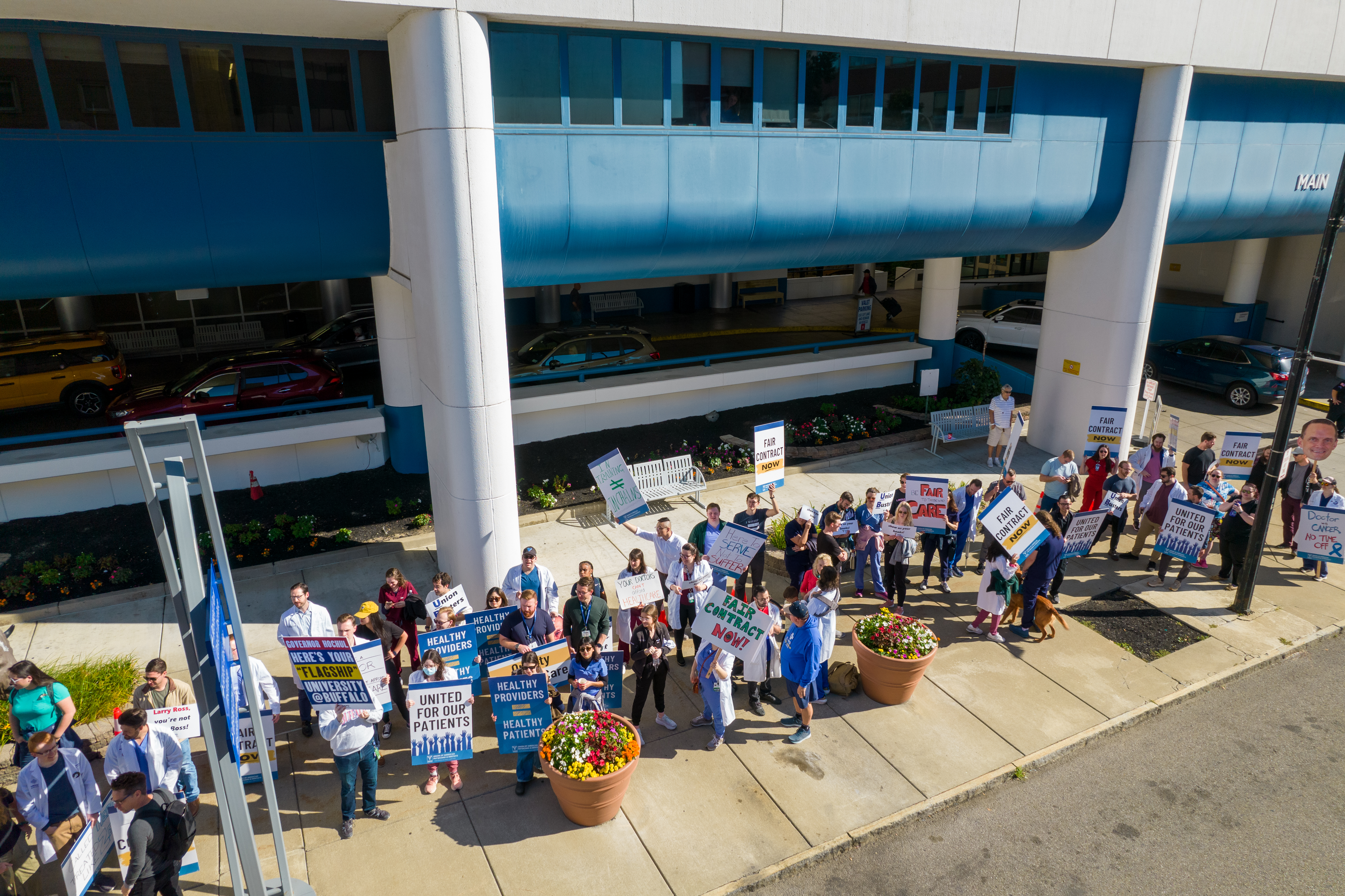You are legally protected to form a union, regardless of your visa status.
It is illegal for UB/UMRS and its affiliates to intimidate, harass, or threaten you or your career for wanting to join a union. This is written in federal law, NLRB Section 7 and 8 Workers Rights. UAPD and its team of attorneys will protect you if any illegal activities occur. Unfair labor practices are lawsuits that will be filed against UB/UMRS for participating in illegal activities.
Report Union Busting Activity here
Under the National Labor Relations Act, employees have the right:
- To self-organization
- To form, join, or assist labor organizations
- To bargain collectively through representatives of their own choosing
- To act together for the purposes of collective bargaining or other mutual aid or protection
- To refuse to do any or all of these things unless the union and employer, in a state where such agreements are permitted, enter into a lawful union-security agreement requiring employees to pay periodic dues and initiation fees. Nonmembers who inform the union that they object to the use of their payments for nonrepresentational purposes may be required to pay only their share of the union’s costs of representational activities (such as collective bargaining, contract administration, and grievance adjustment).
It is the responsibility of the National Labor Relations Board to protect employees in the exercise of these rights.
The Board wants all eligible voters to be fully informed about their rights under Federal law and wants both employers and unions to know what is expected of them when it holds an election.
If agents of either unions or employers interfere with your right to a free, fair, and honest election, the election can be set aside by the Board. Where appropriate, the Board provides other remedies, such as reinstatement for employees fired for exercising their rights, including backpay from the party responsible for their discharge.
The following are examples of conduct that interfere with the rights of employees and may result in the setting aside of the election:
- Threatening loss of jobs or benefits by an employer or a union
- Promising or granting promotions, pay raises, or other benefits to influence an employee’s vote by a party capable of carrying out such promises
- An employer firing employees to discourage or encourage union activity or a union causing them to be fired to encourage union activity
- Incitement by either an employer or a union of racial or religious prejudice by inflammatory appeals
- Threatening physical force or violence to employees by a union or an employer to influence their votes
The National Labor Relations Board protects your right to a free choice Improper conduct will not be permitted. All parties are expected to cooperate fully with this Agency in maintaining basic principles of a fair election as required by law. The National Labor Relations Board as an agency of the United States Government does not endorse any choice in the election.
Legal protections under section 7 and 8(a)(1) of NLRB.
Employees have the right to unionize, to join together to advance their interests as employees, and to refrain from such activity, It is unlawful for an employer to interfere with, restrain, or coerce employees in the exercise of their rights. For example, employers may not respond to a union organizing drive by threatening, interrogating, or spying on pro-union employees, or by promising benefits if they forget about the union.
Section 7 of the National Labor Relations Act (the Act) guarantees employees “the right to self-organization, to form, join, or assist labor organizations, to bargain collectively through representatives of their own choosing, and to engage in other concerted activities for the purpose of collective bargaining or other mutual aid or protection,” as well as the right “to refrain from any or all such activities.”
Section 8(a)(1) of the Act makes it an unfair labor practice for an employer “to interfere with, restrain, or coerce employees in the exercise of the rights guaranteed in Section 7” of the Act. For example, you may not:
- Threaten employees with adverse consequences, such as closing the workplace, loss of benefits, or more onerous working conditions, if they support a union, engage in union activity, or select a union to represent them.
Threaten employees with adverse consequences if they engage in protected, concerted activity. (Activity is “concerted” if it is engaged in with or on the authority of other employees, not solely by and on behalf of the employee himself. It includes circumstances where a single employee seeks to initiate, induce, or prepare for group action, as well as where an employee brings a group complaint to the attention of management. Activity is “protected” if it concerns employees’ interests as employees. An employee engaged in otherwise protected, concerted activity may lose the Act’s protection through misconduct.)
Promise employees benefits if they reject the union.
- Imply a promise of benefits by soliciting grievances from employees during a union organizing campaign. (However, if you regularly solicited employee grievances before the campaign began, you may continue that practice unchanged.)
- Confer benefits on employees during a union organizing campaign to induce employees to vote against the union.
Withhold changes in wages or benefits during a union organizing campaign that would have been made had the union not been on the scene, unless you make clear to employees that the change will occur whether or not they select the union, and that your sole purpose in postponing the change is to avoid any appearance of trying to influence the outcome of the election.
- Coercively question employees about their own or coworkers’ union activities or sympathies, (Whether questioning is coercive and therefore unlawful depends on the relevant circumstances. including who asks the questions, where, and how; what information is sought; whether the questioned employee is an open and active union supporter; and whether the questioning occurs in a context of other unfair labor practices,)
- Prohibit employees from talking about the union during working time if you permit them to talk about other nonwork-related subjects.
- Poll your employees to determine the extent of their support for a union unless you comply with certain safeguards. You must not have engaged in unfair labor practices or otherwise created a coercive atmosphere. In addition, you must (1) communicate to employees that the purpose of the poll is to determine whether the union enjoys majority support (and that must, in truth, be your purpose); (2) give employees assurances against reprisal; and (3) conduct the poll by secret ballot.
- Spy on employees’ union activities. (“Spying” means doing something out of the ordinary to observe the activity. Seeing open union activity in workplace areas frequented by supervisors is not “spying. “)
Create the impression that you are spying on employees’ union activities.
- Photograph or videotape employees engaged in peaceful union or other protected activities.
- Solicit individual employees to appear in a campaign video,
Promulgate, maintain. or enforce work rules that reasonably tend to inhibit employees from exercising their rights under the Act.
- Convey the message that selecting a union would be futile.
- Discipline or discharge a union-represented employee for refusing to submit, without a representative, to an investigatory interview the employee reasonably believes may result in discipline.
- Interview employees to prepare your defense in an unfair labor practice case unless you provide certain assurances. You must communicate to the employee the purpose of the questioning, assure him against reprisals and obtain his voluntary participation, Questioning must occur in a context free from employer hostility to union organization and must not itself be coercive. And questioning must not go beyond what is needful to achieve its legitimate purpose. That is, you may not pry into other union matters, elicit information concerning the employee’s subjective state of mind, or otherwise interfere with employee rights under the Act.
The Importance of Weingarten Rights
The Right to Request Representation During an Investigatory Interview
Section 7 of the National Labor Relations Act (NLRA) protects employees’ right to “self-organization, to form, join, or assist labor organizations, to bargain collectively through representatives of their own choosing, and to engage in other concerted activities for the purpose of collective bargaining or other mutual aid and protection.”
Among the rights protected by Section 7 is the right of union-represented employees, upon request, to have their representative present during an interview that the employee reasonably believes could lead to discipline. This right was first articulated by the Supreme Court in the case, NLRB v. J. Weingarten, Inc. In that case, the Court found that Section 7 of the NLRA protects employees who refuse to submit to certain interviews without a requested representative present.
An employee’s requested representative, which may be a union steward, business agent or officer, or fellow employee, is often referred to as a “Weingarten representative.” Weingarten representatives are entitled to provide advice and active assistance to employees during investigatory interviews. Employees’ right to request their representatives are frequently referred to as “Weingarten rights.”
Employers violate the NLRA if they proceed with an investigatory interview while refusing an employee’s request or retaliate against them for making the request. Depending on the circumstances of each case, the Board may order that the employer cease and desist, post a remedial notice, require the employer to repeat the interview with a union member present, or rescind and remedy discipline resulting from a Weingarten violation.
When do employees have a right to request a union representative?
An employee’s right to request a representative arises during an investigatory interview. A useful comparison is an individual’s Miranda right to an attorney when questioned by law enforcement. However, unlike the right to counsel in a Miranda setting, employers are not required to inform union members of their rights under Weingarten.
Any meeting may be an “investigatory interview” provided that the following occurs:
- A manager, representative of management, or supervisor is seeking to question an employee.
- The questioning is part of an investigation into the employee’s performance or work conduct. During an investigatory interview, a representative of management may require an employee to defend, explain, or admit misconduct or work performance issues that may form the basis for discipline or discharge.
- The employee reasonably believes that the investigation may result in discharge, discipline, demotion, or other adverse consequence to their job status or working conditions.
- The employee requests a union representative. Employers are not required to advise employees of their right to representation and third parties (including union representatives) may not make the request on behalf of the employee.
When making a request for a representative, the Board does not require that the employee specify that they need a “Weingarten” representative. Once an employee requests their representative, they are not required to repeat that request. At times, it is not clear whether a meeting is investigatory or could lead to discipline. In those cases, the National Labor Relations Board (NLRB) looks to the conduct of the meeting and the surrounding circumstances to determine if there was an investigatory purpose. The Board will consider such factors as the identity/status of the participants, the parties’ collective-bargaining agreement and disciplinary practices, whether there was a confrontational tone to the meeting, any notices or warnings issued prior to the meeting, or whether employees had been disciplined for similar misconduct.

Residents and Fellows:
Contact [email protected] for more information or to file grievances.
“Make no mistake, come September 3rd, when we strike, the powers that be are going to cast blame at us; 831 physicians. They are going to say that we’re jeopardizing patient care, or that we have a moral obligation to go back to work. They are going to play on our innate sense of empathy for our patients. but let me say out loud what we all know is true; when we strike, every patient that receives inadequate treatment here, every second more a patient waits in the ER, every stress placed on our healthcare colleagues, and every family member who suffers from this work disruption is the result of corporate greed and the continued decision not to do what is right. Nothing more.”
– Dr. Steve Moran, PGY2 Internal Medicine


